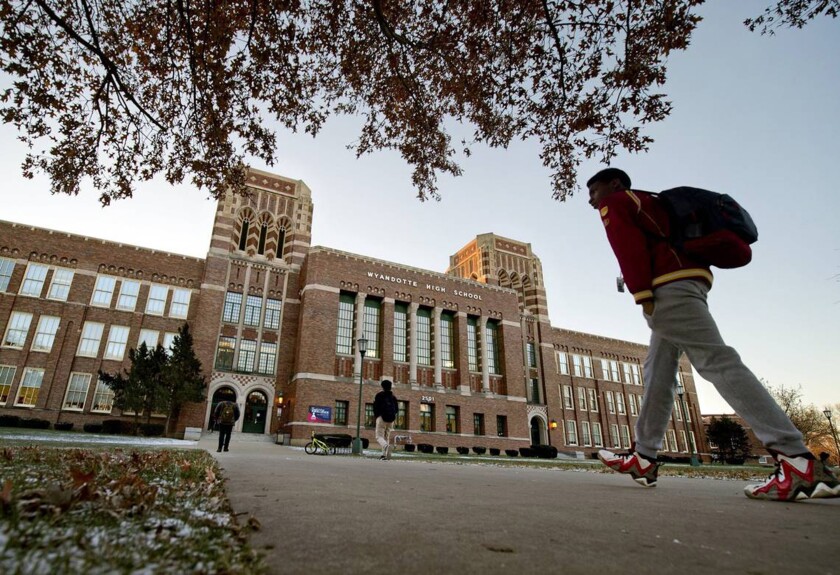Nationally, students in fourth and eighth grade aren’t back to pre-pandemic achievement levels in math or reading, which weren’t particularly great to begin with. Reading scores continue to decline. And while math scores are up in fourth grade, they’re flat in eighth grade, following a historic slide in 2022.
It’s not a question of who is up and who is down. No state made gains in reading in either grade or saw score increases in eighth-grade math. It’s a question for policymakers of where to go from here.
We come from a red state and a blue state, and we belong to different political parties. As state legislators, we disagree on plenty of policies, like vouchers. But we both started our careers as classroom teachers, and there are many things we agree on, starting with our shared belief that all children need an excellent education that lifts them and prepares them for a promise-filled future.
Today’s social media landscape and the move away from shared news sources are just some of the reasons why it’s hard for people to connect across the partisan divide. But if there’s an area that deserves our cooperation, it’s education. From the passage of landmark special education legislation in the 1970s to the approval in the early 2000s of laws that promoted standards-based accountability, big ideas in education historically garner bipartisan support. We need to recommit to this approach so that we can find real solutions to the serious problems schools face today.
We should start by holding all children to high expectations, and being honest when we don’t meet them. We’re troubled that, around the country, states including Alaska, New York, Oklahoma and Wisconsin have lowered standards, or pass rates, on state assessments. In Tennessee, one of us, Mark White, was among the lawmakers who voted against legislation that tried to eliminate annual state testing requirements.
Research and common sense tell us that when you hold kids to high expectations and provide the support to get there, they rise to meet them. The most famous example, sometimes called the “Mississippi Miracle,” occurred when the Magnolia State raised state standards to meet those on the Nation's Report Card, made appropriate investments in its schools and saw significant gains in student achievement. Other states, including Tennessee, followed Mississippi’s lead and saw similar trends.
We’re worried that pulling back from this approach may be why there’s a growing achievement gap between higher- and lower-performing students. On the latest Nation’s Report Card, where there were glimmers of progress, such as in those fourth-grade math gains, higher-performing students drove those improvements. The growing gulf between kids soaring and those struggling has deep implications, since higher-performing students earn more later in life.
The drop in reading scores also is a gut punch that we hope won’t derail bipartisan efforts to improve reading instruction. We’ve been part of a push in our states to put research into practice around the science of reading, which supports using evidence-based approaches to literacy instruction. Today’s lower scores aren’t an indictment of the science of reading. Policies take time to take root. Maryland is in the early stages of this shift, which involves explicitly teaching phonics and building student background knowledge. In Tennessee, many teachers are still receiving training on how to align their instruction to the research. Republicans and Democrats must commit to staying the course despite the pressure we may see to backtrack.
Perhaps there is no other area where we agree more than on the need to support teachers. We understand, as do most Americans, their critical role in kids’ lives. As a former middle school science teacher, Mark is still in touch with students he taught decades ago. Recently, he ran into a woman in his community who told him she became a nurse because she loved his science class.
The other writer of this commentary, Jared Solomon, is the parent of two toddler boys. His oldest recently had a preschool teacher who handpicks books for each student with handwritten, personalized messages. The upshot? His son has learned so much about sea creatures and sometimes, adorably, falls asleep gripping the picture book, Inky’s Amazing Escape, that he received.
There’s no question that teachers have been underappreciated in their attempts to help kids rebound and accelerate their learning. We’ve supported improving teacher pay in our states, and Democrats and Republicans can both look for ways to support the heroes who lead our classrooms. We need to ensure they have strong professional development, the opportunity to advance in their careers, time to plan their lessons and work with kids individually, and the high-quality resources they need to do their jobs well.
The Nation’s Report Card is a wake-up call. If we don’t band together to look at the data underpinning it and take steps to improve student achievement, a generation of students will suffer. No one wants that. Let's get to work.
Jared Solomon is a Democratic member of the Maryland House of Delegates. He began his career as a high school social studies teacher. Mark White is a Republican member of the Tennessee House of Representatives. He started out as a middle school science teacher. Both are members of the National Assessment Governing Board, which sets policy for the Nation's Report Card.
Governing’s opinion columns reflect the views of their authors and not necessarily those of Governing’s editors or management.
Related Articles












